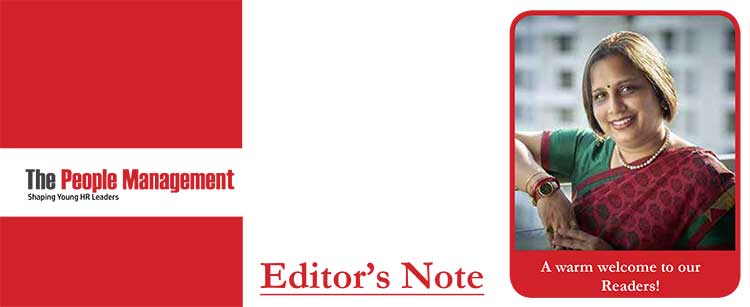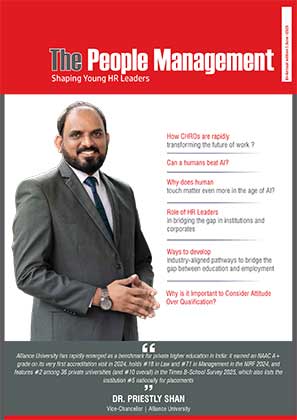The People Management – June 2025

This June 2025 issue focusses on How CHRO’s are transforming the Future of Work & Challenges in Higher Education today.
In a world where industries are evolving with new technologies, diverse workforces, and a focus on the employee experience, the CHRO is leading change and growth.
 Contrary to certain misconceptions, McKinsey’s research reveals the tangible gains of proper HR practices. Organizations that pay attention to HR practices experience better profit margins and have 125% higher project success rates. This clearly indicates that strategic HR is central to the general operational performance of any organization.
Contrary to certain misconceptions, McKinsey’s research reveals the tangible gains of proper HR practices. Organizations that pay attention to HR practices experience better profit margins and have 125% higher project success rates. This clearly indicates that strategic HR is central to the general operational performance of any organization.
Today’s CHRO needs to be aware of the business’s vision, issues, and prospects, in order to adjust the HRM plans to fulfil and advance the business’s aims. This demands knowledge of financial ratios, trends, and competitors within the market or industry. Another area that the CHRO must solve is the issue of working remotely and implementing communication, collaboration, and involvement in various models.
In order to accommodate the highly diverse and mobile workforce, the CHRO has to provide for effective means of communication and teamwork using state-of-the-art digital tools. They also have to set up effective policies and procedures regarding teleworking, which should be applied equally to all employees in similar positions. CHROs can help foster a culture of trust and accountability that enables employees to achieve their highest levels of productivity, whether they’re in the office or not.
CHRO has to ensure that all activities are kept as simple as possible at all times and must always be aligned to the vision and objectives of the CEO and the company. This role also enables the CHRO to undertake a transformation.
The Indian higher education system grapples with several challenges that hinder its effectiveness and inclusivity. Some of the key challenges include:
Access and Equity: Disparities in access to higher education persist along lines of socio-economic status, geography, and gender. Rural areas and marginalized communities often lack adequate educational infrastructure and resources, making it difficult for aspiring students to pursue higher studies.
Quality Assurance: While India is home to many renowned institutions, the overall quality of higher education is uneven. Issues such as outdated curricula, inadequate faculty training, and limited research funding contribute to concerns about the quality and relevance of degree programs.
Employability Gap: Despite holding degrees, many Indian graduates struggle to secure meaningful employment due to a mismatch between academic qualifications and industry requirements. The emphasis on rote learning and theoretical knowledge often leaves students ill-prepared for the demands of the job market.
Research and Innovation: India lags behind in research and innovation compared to other leading nations. Limited investment in research infrastructure, bureaucratic hurdles, and a lack of collaboration between academia and industry hinder the country’s ability to generate cutting-edge knowledge and technologies.
Regulatory Framework: The regulatory framework governing higher education in India is often criticized for being bureaucratic and inflexible. Regulatory bodies such as the UGC and the All India Council for Technical Education (AICTE) face criticism for their inability to adapt to changing educational trends and promote innovation.
Improving Quality: Revising curricula to align with industry needs, enhancing faculty training programs, promoting interdisciplinary research, and fostering academic collaboration with international institutions can enhance the quality and relevance of higher education in India.
The Indian higher education system is at a crossroads, facing numerous challenges while also holding immense potential for growth and transformation. The quality, employability, research, and regulation, India can build a higher education ecosystem that is inclusive, dynamic, and responsive to the needs of its diverse population. Through concerted efforts and collective action, stakeholders can navigate the labyrinth of challenges and pave the way for a brighter future for Indian higher education.
Our team at www.thepeoplemanagement.com is committed to add value to our readers by sharing Articles, Viewpoints, Latest updates, HR Tips & Suggestions, Insights from various Thought Leaders etc. & also organise Roundtable discussions on a wide range of contemporary topics.
Stay Safe, Healthy & Ahead of the game – Happy Reading & Learning in 2025!
Aparna Sharm


